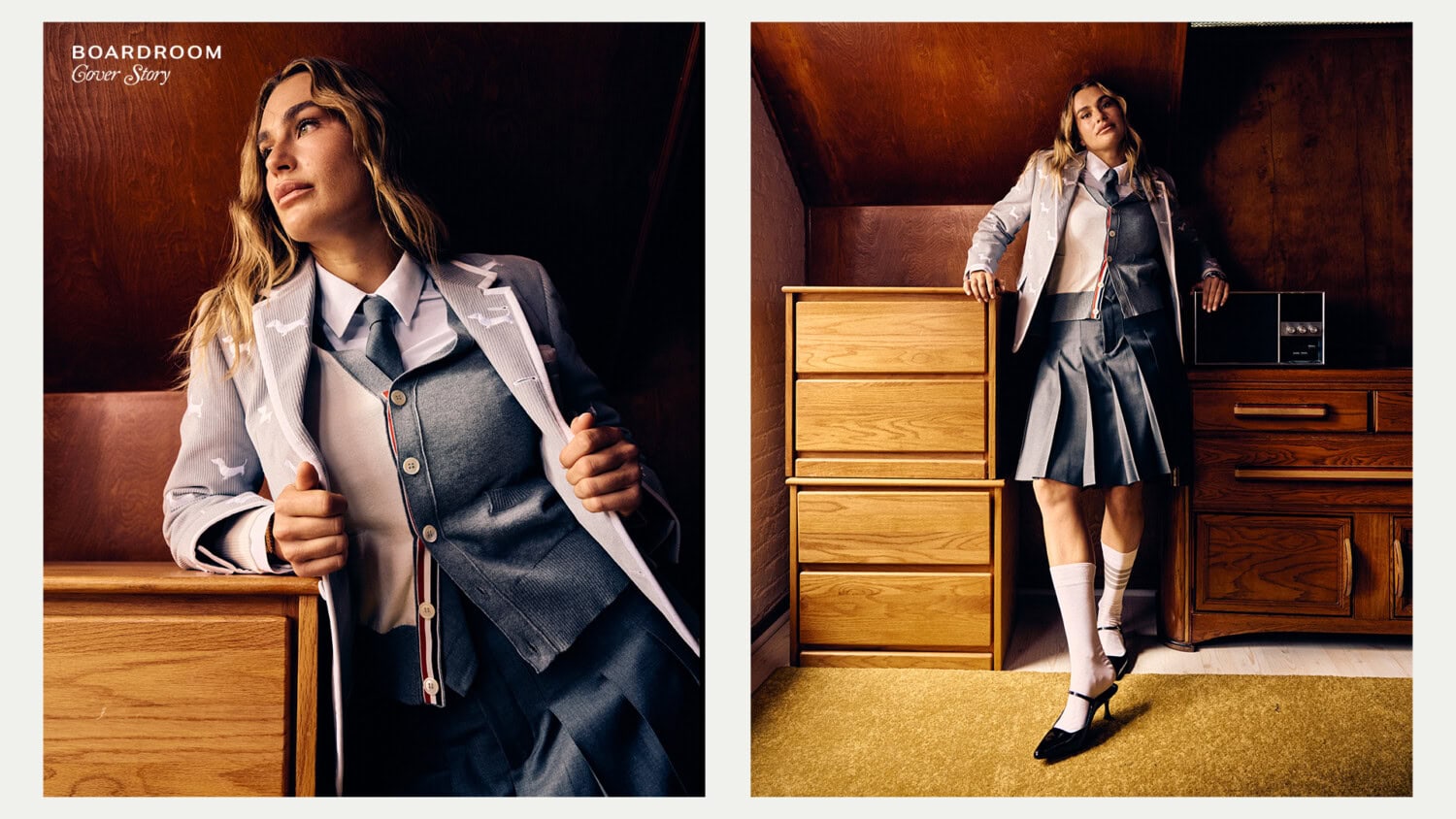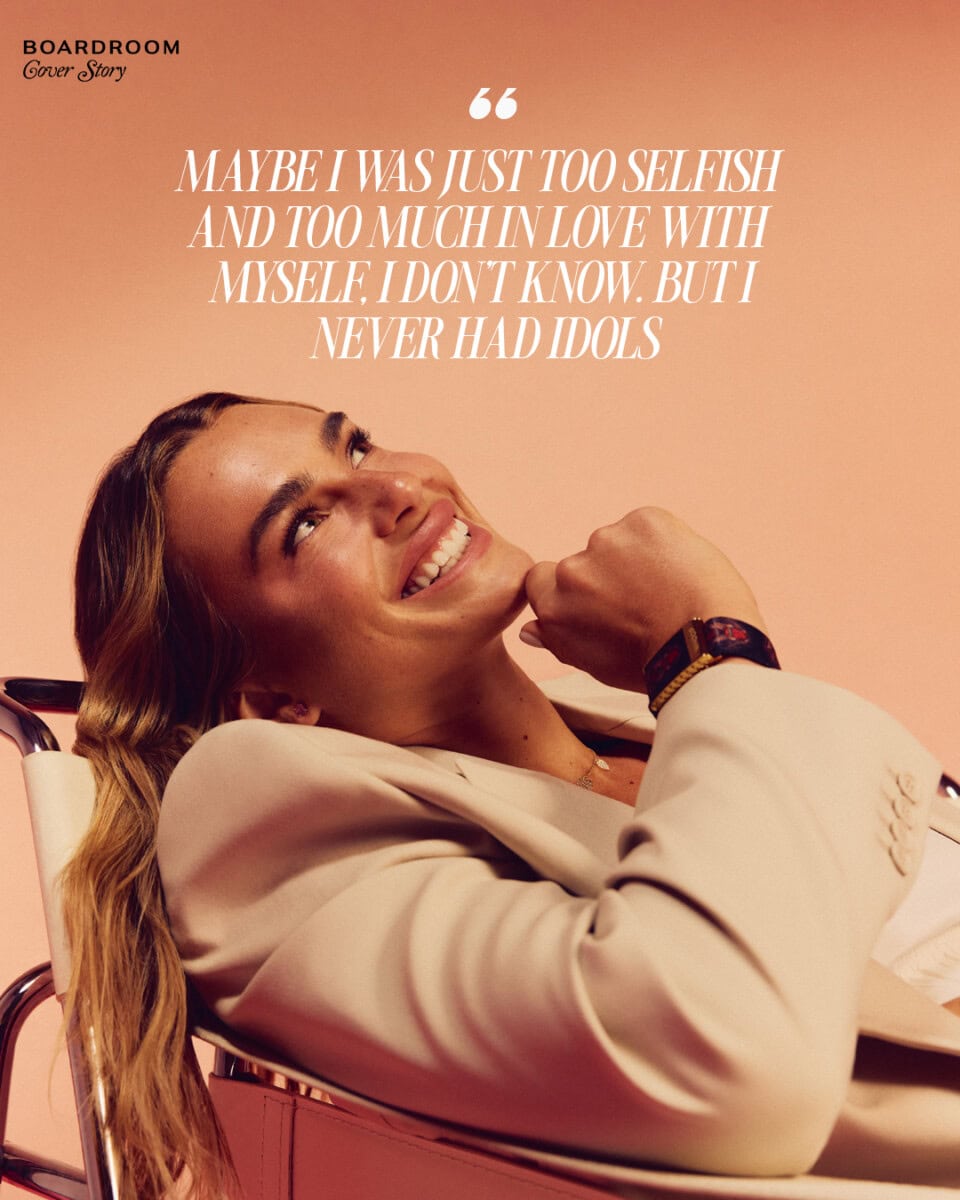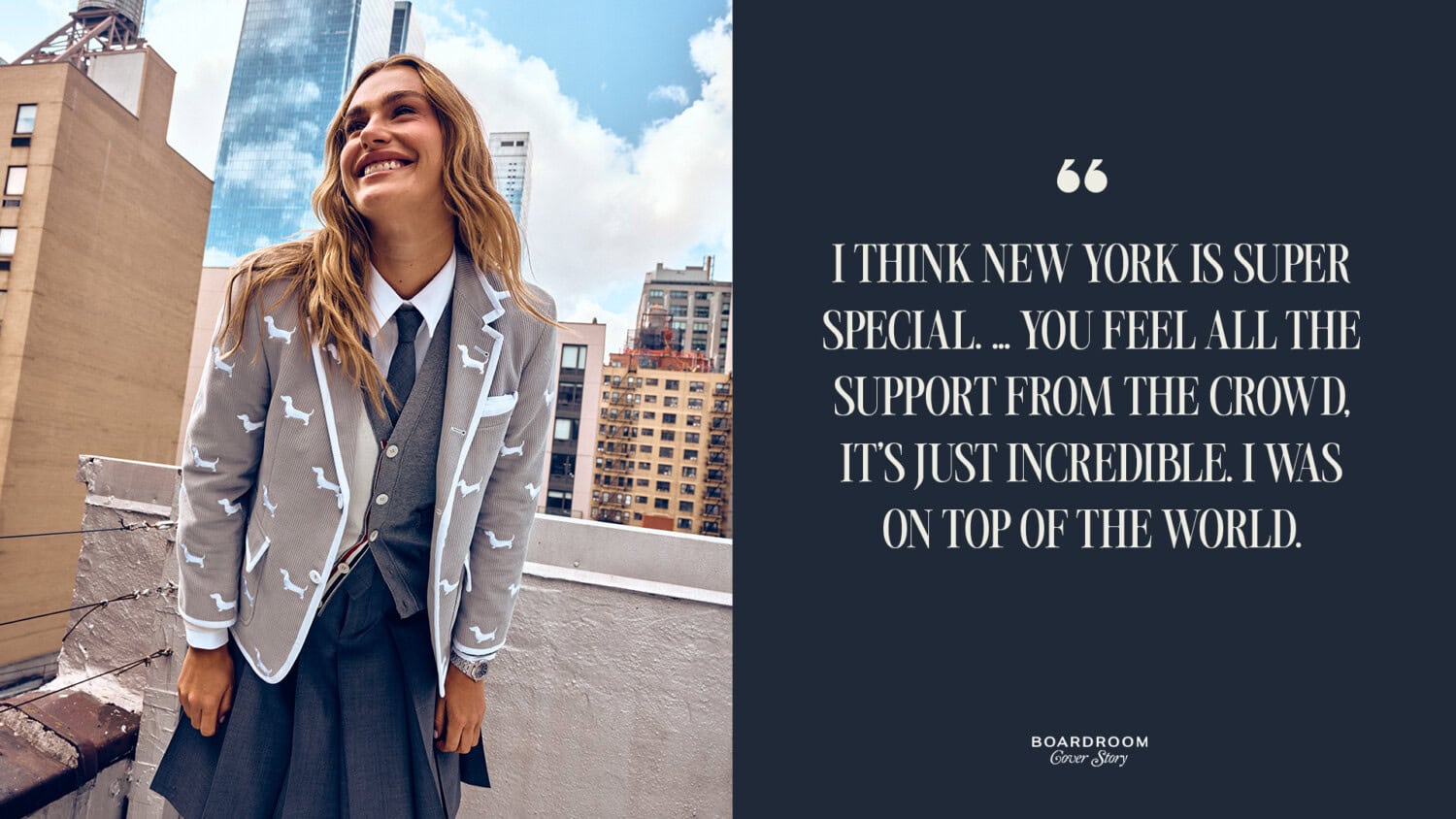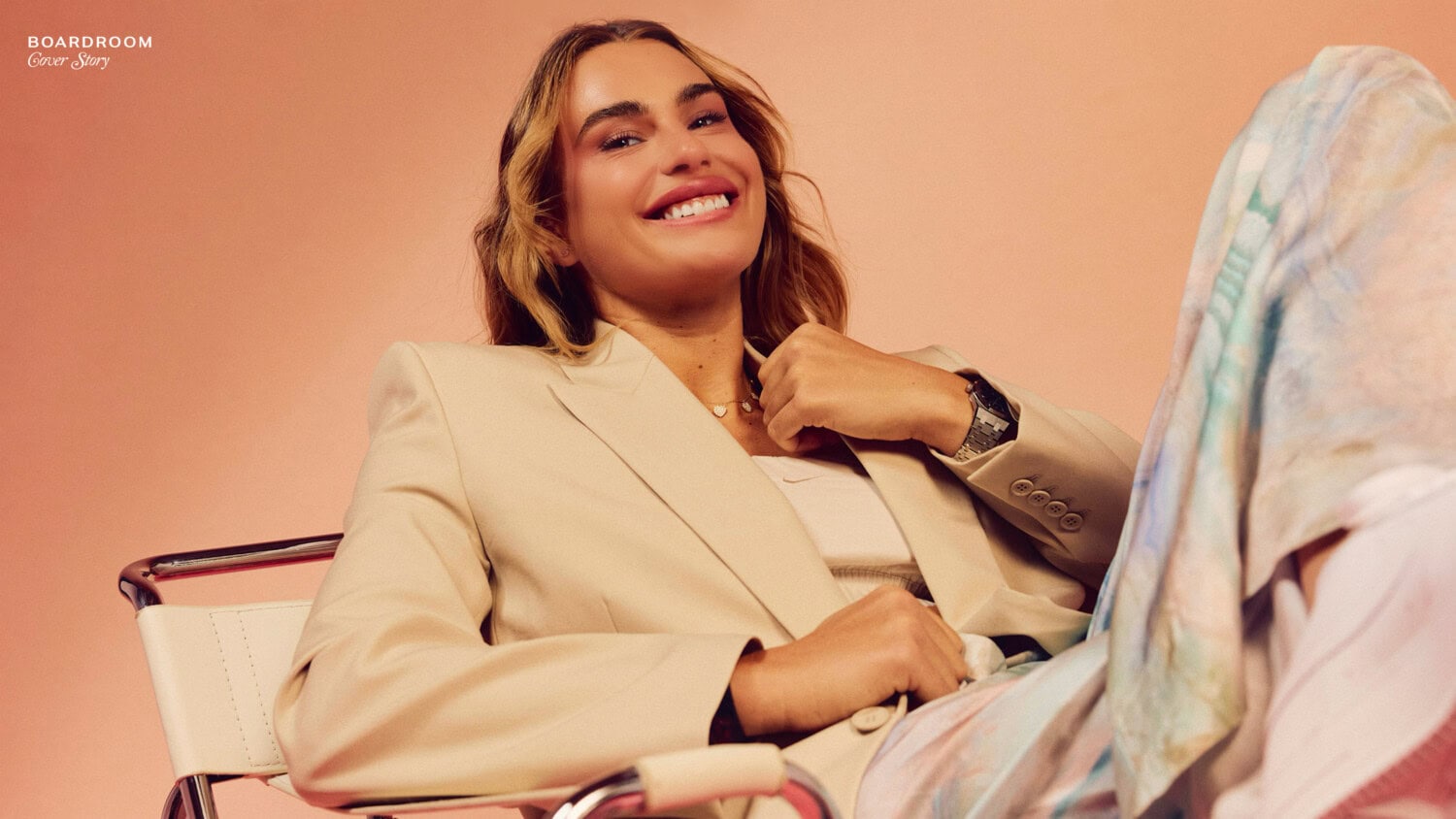At just 27 years old, Aryna Sabalenka sits at the top of her sport. A two-time Australian Open champion and the reigning U.S. Open winner, she is currently ranked No. 1 in the world. But this isn’t a story about overnight success. Born and raised in Belarus, Sabalenka didn’t come up through the usual pipelines or ride the hype of early celebrity. She clawed her way into the sport’s elite through sheer force — of will, of personality, and of power on the court.
In this conversation, which took place back in early May, Sabalenka opens up like never before about the pressure that comes with the crown, the struggle to stay grounded as attention builds, and the evolution she’s undergoing as a businesswoman and global brand. She talks candidly about why she made the switch from IMG to Evolve, what she looks for in a brand partner, and why she wants to be more than just another name in a press release. Sabalenka doesn’t just want to win — she wants to build.

She also pulls back the curtain on what it takes to survive and thrive at the highest level of tennis. The mental toll. The constant travel. The internal battle between aggression and calm. On court, she’s all fire. Off it, she’s self-aware, sharply funny, and deeply intentional. Whether it’s pushing Nike to rethink athlete partnerships or naming her dream list of fashion houses, Sabalenka speaks with the confidence of someone who knows her value — and isn’t afraid to fight for it.
She may not have grown up with idols, but Sabalenka is quickly becoming one herself. And as she looks ahead to the next phase of her career, she’s not just chasing Grand Slams — she’s laying the groundwork to be a generational force, in tennis and beyond.
This interview has been edited for length & clarity.
Want More from Boardroom? Get Our Newsletter
BOARDROOM: The last six years, you’ve been in the top 10. What was the moment when you started to feel as if you were breaking through?
ARYNA SABALENKA: Well, it’s a long process. Since a very young age, I was dreaming of becoming number one. It’s hard work. The moment I broke through the top 50, and I was getting better and better every year, I felt like maybe I could get there. And then when I broke through the top 10, I had the confidence that one day I’ll be able to reach my goal. I was just working really hard, and I had this strong belief that I’ll be able to break that wall.
But does it still blow your mind thinking about the work you put in? Growing up in Belarus, and now you’re No. 1 in the world.
Yeah, I think whenever you reach any of your goals, the moment you reach it, you just have all of those memories from the past: what you went through, what it actually took you to get where you are. And, yeah, it blows your mind. I went through a lot.
Do you feel people treat you differently or that your peers look at you differently now that you’re No. 1? Do things change from that standpoint?
You definitely get more attention, and there are definitely people who are trying to get close to you, but you see those people. I’m the person who is nice to everyone, but whenever I see something weird, I keep people away. But I definitely get more attention. People want to see your life, and I have no problem with sharing my life. I love to share my life with the fans; I love being in this position.
There’s so much pressure in sports in general, but I always think about tennis as having this intense pressure, being an individual sport. Does another layer of pressure start to creep in when you get to that top spot? Because when you’re climbing and you’re eyeing it, it’s such a clear vision, but when you’re there, it’s about maintaining it.
I think pressure is part of our lives, and the moment you understand that this is normal and you don’t have to avoid it, you just have to live with it. It’s constantly there, but you put it aside and you focus on different things. And once again, I think it’s really important to have the right people around you because when you have this healthy environment and great team, family, friends, just when you have a really healthy environment, it also helps to forget about the pressure and focus on the right things.

And is it one of these things where, when you think back to people’s careers, they talk about majors? So even though being No. 1 in the world is incredible, is the real focus still for somebody in your position about the majors?
Of course, everyone is chasing majors, and nobody really, I think, in the top 10, nobody really cares about ranking. It only makes a difference in your contracts and the bonuses you’re getting. So, of course, you want to stay as high as possible, but I think to keep being where you are, you have to focus on improving yourself every day and trying to bring something new to the game, trying to, in some ways, surprise yourself with the new tools. I think at the end of the day, we all focus on titles, on getting as many titles as you can.
Do you watch a lot of film on your matches and your opponents, and see things that you want to constantly improve on?
Well, I leave that part for my team. I don’t like watching myself playing. I get annoyed by the way I am on court because it’s so different, and it’s so aggressive, and I feel embarrassed every time. Even though I understand this is the way I have to be successful in what I do. But in preparation for the matches, I watch my opponents just so I can prepare for their game and just to know what to expect. And then after matches, my team talks to me and they say, ‘OK, this didn’t work, this worked really well, and this is where we have to improve, and this is what we’re going to do the next day.’ I have a really good team to take care of that.
So, you mentioned your on-court demeanor. [You’re] funny, bubbly, and fun off the court, and such a gangster on the court.
Yeah, because I mean, I dedicate my whole life to sport, and I want to be successful, and this is something big for me and important for me and my family. There’s no time for jokes. I’m there to play, to fight, and to get the wins, and I cannot be a nice person there. I’m there to get the win no matter what. And still, with the years, with the experience, I managed to have fun there, to be kind of nicer. But whenever there is the moment of, OK, this is the point [I have to get], the game I have to win. I’m going to be 100% on, and I’m going to be aggressive. So, it’s balanced.
Is it hard to turn that off?
No, it’s natural. Whenever the match is finished, I’m back to being normal.
The real you.
Real me.
Historically, women especially, have gotten criticism [for their on-court reactions]. Serena got a lot of that throughout her career. Has watching her from afar growing up, and other players, helped you in dealing with that? When you’ve had people say things at times about your court demeanor as opposed to your off-court demeanor?
I have a very funny story from a very young age. People were comparing me to her, like you’re next. I was very little, like 8 or 9. And whenever people would call me different names, like current top players, I would just look and say, ‘No, I’m Sabalenka.’ I have no clue why and how it came to my mind to say this stuff. I watched tennis, of course, but I would never look at someone and think, ‘Oh my god, I want to be her.’ I think I was just too focused on my life, on playing tennis, having fun, trying to be as good as possible.
Of course, I want to dominate the way Serena was dominating the tour. But growing up, I didn’t have any idols. I don’t know if it’s good or bad because everyone was inspired by someone, and I want to be an inspiration for the next generation. I think that’s the goal in life. But, personally, I was just too focused. Maybe I was just too selfish and too much in love with myself, so I was doing my thing. But I never had idols.

I’ve worked with a lot of professional athletes. That seems to be common. And I think it’s probably that thing that separates the greats. I’ll ask athletes who their favorite players were growing up or who their favorite teams were, and they’ll [say] ‘I was on the court, I was out playing, I was focused on me.’
Maybe you’re right. Maybe that’s the way to success.
Last year, you won the U.S. Open, and you had won two Australian Opens before, but what does New York City mean to you, and what was that moment like last year, winning on that stage?
It was a very special moment. I was on top of the world at that moment because I struggled a lot in the past in New York, and this was the Slam. I badly wanted to win. I would fail in the final against [Coco Gauff] even though I felt like, OK, everything is going my way, and I felt like I was controlling the game, but I still lost it. Getting that win, it was just like everything happened for a reason. I was enjoying it. I felt like, OK, now I’m where I’m meant to be. I finally got this beautiful trophy. I think New York is super special. It’s a big city, there are big people watching you play, and the crowd is incredible. And if you feel all the support from the crowd, it’s just incredible. I was on top of the world.
I was at the match the year before your semis loss, and then I was at your win this past year, and you could tell the crowd felt that, too. They were behind you.
Yeah, it took me a little while to build that. I don’t [get] that kind of love from the crowd here because, I don’t know why, but every time in the finals I play against Americans. It’s like a test. ‘Ha, it got you. Now you have to pass the test.’ And going into the last final against Tela, I was kind of praying like, Please, if not half people just like 15, 20%. I just need a little support. I felt like I was the American. I felt all the support, and I had goosebumps, honestly. I had goosebumps every time I would make a point. I felt the support, and this is what actually motivates me and helps me to keep going.
You’re incredible on every surface, but would you say there’s a surface that you’re still trying to conquer in your mind?
No, I think I’m pretty confident on every surface. It’s just I’ve never been successful on clay and grass compared to hard court, but I really think it’s just because we play most of the times on the hard court and if I would have a little bit more chances on the clay court, like a bit longer season on the clay, maybe I would be more successful than I am. But I love playing on every surface
And you adjust your game. There are certain things that change according to the surface.
Yeah, you have to adjust. Hard court is a bit faster, and you just go for it. Clay court, you have to build to a point, and it’s physically tougher. Grass is just super, super fast and super low, and you got to have a good touch to play there.
Is there a part of your game that you want to keep evolving?
Yeah, I’m going to have a better slice, and I want to use it more often.
You mentioned New York and winning, and how things changed for you. What were some of those things that started to come to you after winning here?
Well, I think it’s exploding me more than the Australian Open and then the rest of the tournaments I played in. I think people get to know you more, and brands see you. It’s very good because you have more opportunities to talk to the brands and to build good connections with your favorite brands.

And, obviously, as that happens, having the right team around you is important. In this past year, you made a switch and joined the team at Evolve. What was the genesis behind that and the thought process in making that switch?
Well, I didn’t like the way IMG approached things. If you want to build something big and something for yourself, and you want to build your brand and not just get the momentum deals, they’re not going to help you on that. I never had a structured plan for what I actually want, where I want to be, which brands I want to work with. I’m not going to talk about them overall, but I’m going to say that with me personally, they weren’t really focused on me, on building my brand. I was just one of so many. And it’s tough to compete with the rest of the players they have because of the market and nationality. I think that they weren’t ready to put the hard work into helping me. I found a great team. I feel super connected, and I really love those guys.
Also, it’s a natural progression. I think it happens a lot – you grow and you change.
As you look back, you see that all of the top players at some point leave IMG.
You talked earlier about how there weren’t players that you necessarily aspired to be, but some of these businesses that players like Roger Federer were able to build, and even across sports, you see so many of these successful athlete entrepreneurs. Is that something that you’ve aspired to? What do you see that interests you in all of that?
Well, I love to see the way, as you said, Federer and Nadal and all of these big athletes build their business behind their sport because I think it’s really important to build something outside of tennis because your career is not long enough and you have to have something else outside of your sport. I love fashion, I love business, I love to learn new stuff, and work with different brands, and invest money. I definitely look up to people like Federer. I was following his career outside of tennis just so I can learn a little bit and see what I can do to get better at this part of my life.
When I was younger, it felt like tennis players retired earlier. Do you think you’re at your peak right now? Do you feel like you can keep getting better and better?
I think I’m still improving, and I think I still can get better, but it’s a tough question for women because for guys, it’s all about their lifestyle to stay healthy now. First of all, even fitness is different. Everyone is aware of that stuff, and they build their body just so their career can be longer, but for women, there is another part, which is building the family. Of course, ideally, I’m not retiring anytime soon, but I want at some point, I don’t know, five to 10 years, maybe not 10, but maybe like seven years, I want to build a family and probably come back and try to get back on [this] level. I just have so much love and passion for the sport, and that’s literally everything I’ve been doing my whole life. I think it’s going to be very tough for me to retire. So, I think I’ll be one of those people who is very old, but keep trying.
There have been other examples. People are coming back all the time now,
But it’s tricky. I don’t want to just come back and be on this middle level.

What do you look for with a brand partner? What, for you, is attractive and what part of that relationship do you enjoy?
Well, I love to see that people are always improving and that they try to be the best at what they do. I feel like this is something similar to what I do on court. I also love to build close connections with the brands and feel like part of the family. They help me, and I want to help them to represent their brand as best as possible. Also, it is inspiring to see how professional they are in the way they want to build a brand. It’s also good for me to see and probably take something outside, take something from there to help me to build my brand, to see how I actually have to work to do something else.
And who are some of your brand deals?
[Audemars Piguet], Nike, Wilson, Dobel Tequila, Oakberry, of course. All of them are very professional at what they do, and I feel very close. These brands, like AP, help you to get into the fashion world and build your connections, and talk to really high-profile people. I’m getting better. I’m learning, and I can talk, and I can ask, I can get advice. I love to work with those brands.
You’ve been in a lot of magazines, you photograph beautifully, and you talked about all these brands. Are there other brands in the fashion space that you love from afar? Not even about working with them, but brands that you love.
Oh my god, I love so many brands. Of course, Yves Saint Laurent, Eva Ali is amazing, Miu Miu, they have really cool stuff. Frankie Shop is unbelievable for basic stuff like blazers, jackets. What else? I can just keep going … The Row. I love The Row, so good, the quality.
Do you think you could design at some point in your life? Do you like that process?
I love that process. I definitely can give some ideas, but I’m not that professional at that, so I cannot put the picture together. I have ideas, which I can throw to the people who can make them live.
What’s the best city to shop in?
The best city? You mean price-wise?
Or just for you. Where do you enjoy shopping? Paris?
Oh, Paris, definitely Paris. I never shop in Milan, but I’ve heard a lot, so I would like to go there. I like to shop in New York.
Wherever you are.
Yeah, yeah, exactly.
Alright, before I let you go, as a tennis fan, it would be interesting for me to hear who would you say are your top five favorite players of all time. Men and women.
Definitely Federer. Nadal. The hard work they put in. It’s crazy. I mean, of course, Serena, the way she dominated. Steffi Graf, I love her so much. Is it four?
I think we’re at four.
Oh, Agassi.
Yeah, you got to keep them together. And my last question, there’s been a lot of talk about player unions and certain changes that players want to see. If you were in charge of the WTA for a day, what would you like to change?
Well, I mean, prize money. But it’s not only for WTA. I think the percentage we’re getting out of revenues and everything, we deserve to get more. And I think even if you compare our sport to others, like NBA, NHL, if you see the percentage, it’s a joke. I think we need to bring this number a bit higher.
Twenty years from now, what would you like someone to say about you?
She was a beast. Beauty and the Beast.
Interviewer – Rich Kleiman
Photographer – Grace Rivera
Photography Assistant – Jimin Ou
VP, Content – Damien Scott
Art Director – Michelle Lukianovich
Sr. Director of Video – Andrea Masenda
Senior Producer – Craig Newton
Video Producer – Audrey Blackmore
Clothing Stylist – Marissa Pelly
Styling Assistant – Jordan Kennedy
Hair Stylist – Takuya Yamaguchi
Makeup Stylist – Dani Parkes
Floral Designer – Diana Barrientos, Florez Studios
Manager of Content Operations – Griffin Adams
Sr. Director of Social – Yoni Mernick
Sr. Director of Audience Development – Jonathan Wiener
Director, Marketing – Stephanie Talmadge
CMO – Sarah Flynn
Co-Founders – Rich Kleiman & Kevin Durant